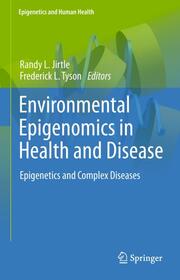Detailansicht
Environmental Epigenomics in Health and Disease
Epigenetics and Complex Diseases, Epigenetics and Human Health
ISBN/EAN: 9783642435959
Umbreit-Nr.: 8272000
Sprache:
Englisch
Umfang: xiv, 339 S.
Format in cm:
Einband:
kartoniertes Buch
Erschienen am 23.06.2015
Auflage: 1/2015
€ 213,99
(inklusive MwSt.)
Nachfragen
- Zusatztext
- There are now compelling human epidemiological and animal experimental data that indicate the risk of developing adult-onset complex diseases and neurological disorders are influenced by persistent epigenetic adaptations in response to prenatal and early postnatal exposures to environmental factors. Epigenetics refers to heritable changes in gene function that occur without a change in the sequence of the DNA. The main components of the epigenetic code are DNA methylation, histone modifications, and non-coding RNAs. The epigenetic programs are established as stem cell differentiate during embryogenesis, and they are normally faithfully reproduced during mitosis. Moreover, they can also be maintained during meiosis, resulting in epigenetic transgenerational disease inheritance, and also potentially introducing phenotypic variation that is selected for in the evolution of new species. The objective of this two volume book is to provide evidence that environmental exposures during early development can alter the risk of developing medical conditions, such as asthma, autism, cancer, cardiovascular disease, diabetes, obesity, and schizophrenia later in life by modifying the epigenome. Consequently, epigenetic research promises to markedly improve our ability to diagnosis, prevent, and treat the pathological conditions of humans; however, it also introduces unique legal and ethical issues. This volume highlights the correlation between environmental factors and complex diseases, such as autism, addiction, neurological diseases, diabetes, obesity and cancer. It concludes with a chapter on legal and ethical implications of epigenetics.
- Kurztext
- The capacity of the epigenome to interpret both internal and external stimuli and alter expression programs is a critical component in normal development, aging, and disease pathogenesis. In the past decade, we have witnessed an explosion of unprecedented research on and support for epigenetics, epigenomics, and their interface with human health and disease. In this volume, Environmental Epigenomics in Health and Disease - Epigenetics and Complex Diseases, a number of leading investigators in the field of epigenetics discuss patterns of epigenomic modifications in normal cells, and how environmentally-induced changes in them are associated with disease pathogenesis. The authors comprehensively review the epigenetic adaptations that occur in human embryonic stem cells, as well as in differentiating cells and organs such as the brain when exposed to environmental factors, and discuss the legal and ethical implications of such alterations. The overall purpose of this volume and its companion, Environmental Epigenomics in Health and Disease - Epigenetics and Disease Origins, is to give readers an overview of how environmental exposures during early development can influence disease formation by disrupting epigenetic programming.
